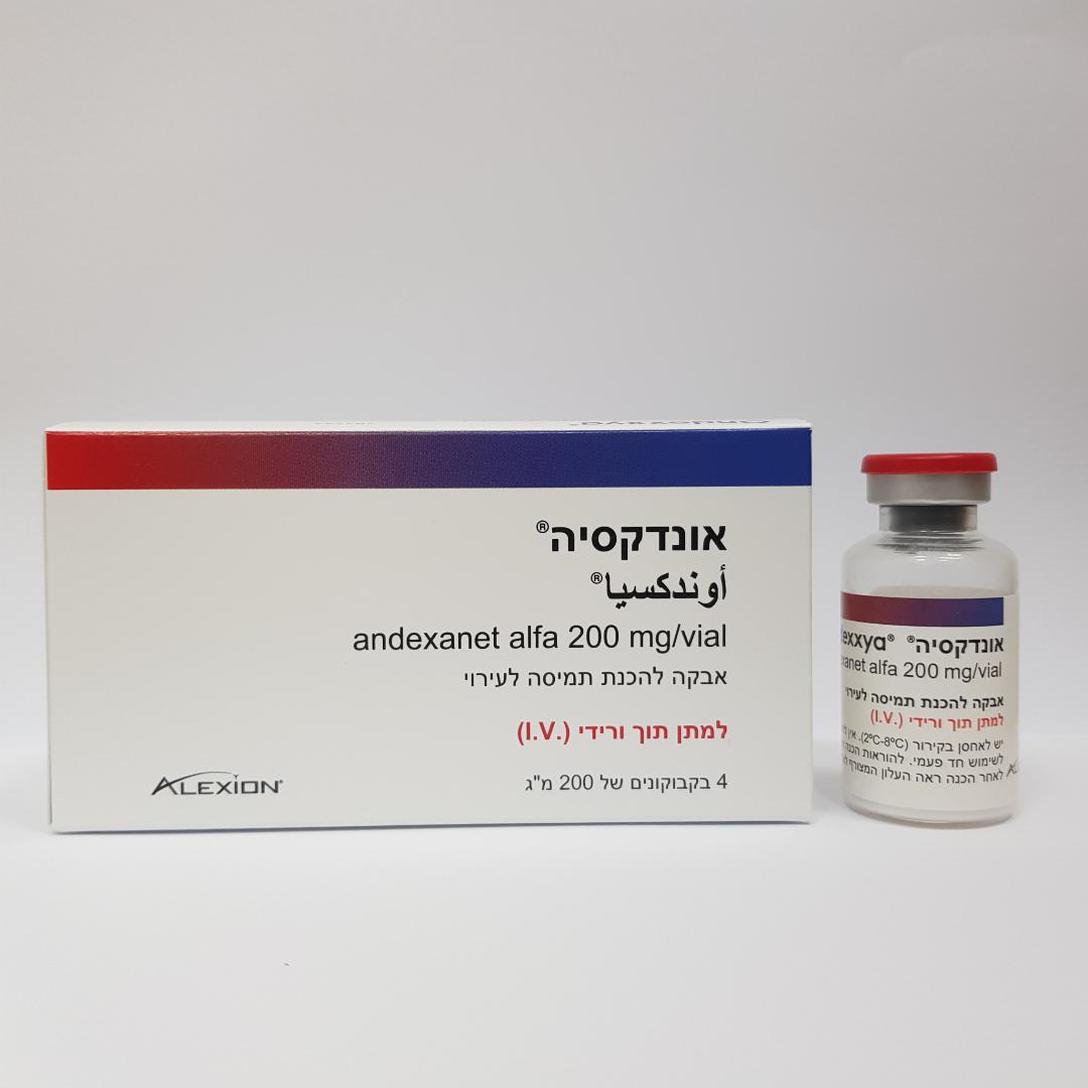Quest for the right Drug

אונדקסיה ONDEXXYA (ANDEXANET ALFA)
תרופה במרשם
תרופה בסל
נרקוטיקה
ציטוטוקסיקה
צורת מתן:
תוך-ורידי : I.V
צורת מינון:
אבקה להכנת תמיסה לאינפוזיה : POWDER FOR SOLUTION FOR INFUSION
עלון לרופא
מינוניםPosology התוויות
Indications תופעות לוואי
Adverse reactions התוויות נגד
Contraindications אינטראקציות
Interactions מינון יתר
Overdose הריון/הנקה
Pregnancy & Lactation אוכלוסיות מיוחדות
Special populations תכונות פרמקולוגיות
Pharmacological properties מידע רוקחי
Pharmaceutical particulars אזהרת שימוש
Special Warning עלון לרופא
Physicians Leaflet
Special Warning : אזהרת שימוש
4.4 Special warnings and precautions for use Limitations of use Clinical efficacy is based upon reversal of anti-FXa-activity in healthy volunteers and bleeding patients dosed with apixaban or rivaroxaban. Andexanet alfa is not suitable for pre-treatment of urgent surgery. Use for edoxaban or enoxaparin-reversal is not recommended due to lack of data. Andexanet alfa will not reverse the effects of non-FXa inhibitors (see section 5.1). Treatment monitoring should be based mainly on clinical parameters indicative of appropriate response (i.e., achievement of haemostasis), lack of efficacy (i.e., re-bleeding), and adverse events (i.e., thromboembolic events). Treatment monitoring of andexanet alfa should not be based on anti-FXa-activity. Commercial anti-FXa-activity assays are unsuitable for measuring anti-FXa activity following administration of andexanet alfa as these assays result in erroneously elevated anti-FXa activity levels, thereby causing a substantial underestimation of the reversal activity of andexanet alfa. Dosage recommendation is based upon data-modelling in healthy volunteers. Validation has not been successful, yet. Data from bleeding patients are limited. Data suggest higher risk of thrombosis for patients receiving the higher dose of andexanet, previous lower dose of the anti-FXa inhibitor, and patients on rivaroxaban. In study 14-505, intracranial haemorrhage (ICH) patients (GCS > 7 and haematoma volume < 60 mL) have been included. Treatment of patients with more severe ICH with andexanet alfa has not been studied. Thrombotic events Thrombotic events have been reported following treatment with andexanet alfa (see sections 4.8 and 5.1). Patients being treated with FXa inhibitor therapy have underlying disease states that predispose them to thrombotic events. Reversing FXa inhibitor therapy exposes patients to the thrombotic risk of their underlying disease. In addition, independent pro- coagulant effect of andexanet alfa, mediated by inhibition of tissue factor pathway inhibitor (TFPI), has been demonstrated, which may pose a risk of developing thrombosis. Duration of this effect in bleeding patients is not known. Laboratory parameters as anti- FXa activity, endogenous thrombotic potential (ETP), or markers of thrombosis might not be reliable for guidance. To reduce this risk, resumption of anticoagulant therapy should be considered as soon as medically appropriate after completion of treatment. In healthy volunteers, dose-dependent increases in coagulation markers F1+2, TAT, and D- dimer, and dose-dependent decreases in TFPI, after administration of andexanet alfa were observed, but no thromboembolic events were reported. These markers were not measured in patients enrolled in study 14-505, but thromboembolic events have been observed (see section 4.8 and 5.1). Monitoring for signs and symptoms of thrombosis is, therefore, strongly recommended. Use of andexanet alfa in conjunction with other supportive measures Andexanet alfa can be used in conjunction with standard haemostatic supportive measures, which should be considered as medically appropriate. The safety of andexanet alfa has not been evaluated in patients who received prothrombin complex concentrates, recombinant factor VIIa, or whole blood within seven days prior to the bleeding event, as they were excluded from clinical trials. Pro-coagulant factor treatments (e.g., 3- or 4-factor prothrombin complex concentrate (PCC)/activated PCC, recombinant factor VIIa, fresh frozen plasma) and whole blood should be avoided unless absolutely required, due to lack of data in combination with these treatments. Interaction with heparin Use of andexanet prior to heparinization e.g. during surgery should be avoided as andexanet causes unresponsiveness to heparin. Use of andexanet as an antidote for heparin or low- molecular weight heparin has not been evaluated and is not recommended (refer to section 4.5.). Infusion-related reactions In case of mild or moderate infusion reactions, careful observation may be sufficient. For moderate symptoms, consideration may be given to a brief interruption or slowing of the infusion with resumption of the infusion after symptoms subside. Diphenhydramine may be administered. Traceability In order to improve the traceability of biological medicinal products, the name and the batch number of the administered product should be clearly recorded.
Effects on Driving
4.7 Effects on ability to drive and use machines Andexanet alfa has no or negligible influence on the ability to drive and use machines.

שימוש לפי פנקס קופ''ח כללית 1994
לא צוין
תאריך הכללה מקורי בסל
לא צוין
הגבלות
לא צוין
מידע נוסף
